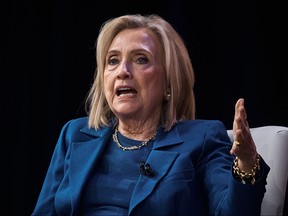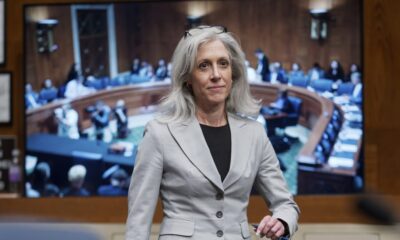Health
Former CDC Leaders Criticize RFK Jr. for Health Policies

Former directors of the U.S. Centers for Disease Control and Prevention (CDC) have publicly condemned Robert F. Kennedy Jr. for his health policies, which they argue threaten public safety. In a recent op-ed published in *The New York Times*, these leaders criticized Kennedy’s stance on vaccines, his calls to reduce funding for medical research, and his dismissive attitude towards healthcare professionals, which led to significant job losses within the sector. This backlash follows the recent dismissal of CDC Director Dr. Susan Monarez.
The shake-up at the CDC has already seen the resignation of at least three senior officials, including Chief Medical Officer Debra Houry. Some of these resignations have been attributed to frustrations over the current vaccine policies and the leadership direction under Kennedy, as highlighted by a report from BBC Radio 4.
Concerns from Public Health Experts
Dr. Tyler B. Evans, a noted public health and infectious disease expert, has added his voice to the growing criticism of Kennedy. In an op-ed for *Men’s Health*, Evans expressed concern over the politicization of healthcare and the potential consequences of undermining established medical practices. With extensive experience dealing with major disease outbreaks, including two Ebola crises, Evans has worked globally with organizations like Doctors Without Borders and Partners in Health.
Evans stated, “You have effectively broken down a system where experts are no longer telling us anything. As a result, people will start making their own decisions, and people will get sicker.” He emphasized the importance of maintaining the integrity of vaccination programs, describing them as a critical social contract. Evans warned, “When the credibility of the panel advising our immunization policies is undermined, that contract begins to unravel.”
On the topic of advanced vaccines, particularly mRNA technology, Evans criticized Kennedy’s rejection of scientific advancements. He remarked, “mRNA vaccines have been unfairly cast as a political wedge when they should be recognized as one of the greatest breakthroughs in modern medicine.” He pointed out that the issue extends beyond just mRNA vaccines, indicating a broader concern regarding public acceptance of scientific innovation.
The Threat of Misinformation
Evans raised alarms about the spread of misinformation in public discourse, stressing its capacity to jeopardize lives. “When you sow doubt about the legitimacy of scientific consensus, that doubt spreads. Today it’s COVID-19, tomorrow it’s HPV, MMR, or the flu,” he said. The implications of this misinformation are significant, leading to preventable outbreaks and avoidable deaths, particularly among vulnerable populations.
He further criticized Kennedy’s approach, highlighting a lack of a scientific mindset. “Innovation cannot thrive in an environment where science is treated like opinion,” Evans noted. He warned that prioritizing political convenience over evidence-based decision-making risks undermining the very foundations of public health leadership.
Evans is also the author of a new book titled *Pandemics, Poverty, and Politics: Decoding the Social and Political Drivers of Pandemics from Plague to COVID-19*, published by Johns Hopkins Press. In this work, he explores how socio-political factors such as inequality and poverty exacerbate the impact of pandemics.
As the CDC faces internal turmoil and external criticism, the ramifications of these developments could have lasting effects on public health policy and the trust placed in health authorities. The voices of experienced professionals like Evans serve as a reminder of the critical importance of scientific integrity in shaping health outcomes.
-

 Politics4 weeks ago
Politics4 weeks agoSecwepemc First Nation Seeks Aboriginal Title Over Kamloops Area
-

 World5 months ago
World5 months agoScientists Unearth Ancient Antarctic Ice to Unlock Climate Secrets
-

 Entertainment5 months ago
Entertainment5 months agoTrump and McCormick to Announce $70 Billion Energy Investments
-

 Science5 months ago
Science5 months agoFour Astronauts Return to Earth After International Space Station Mission
-

 Lifestyle5 months ago
Lifestyle5 months agoTransLink Launches Food Truck Program to Boost Revenue in Vancouver
-

 Technology3 months ago
Technology3 months agoApple Notes Enhances Functionality with Markdown Support in macOS 26
-

 Lifestyle3 months ago
Lifestyle3 months agoManitoba’s Burger Champion Shines Again Amid Dining Innovations
-

 Top Stories2 months ago
Top Stories2 months agoUrgent Update: Fatal Crash on Highway 99 Claims Life of Pitt Meadows Man
-

 Politics4 months ago
Politics4 months agoUkrainian Tennis Star Elina Svitolina Faces Death Threats Online
-

 Sports5 months ago
Sports5 months agoSearch Underway for Missing Hunter Amid Hokkaido Bear Emergency
-

 Politics5 months ago
Politics5 months agoCarney Engages First Nations Leaders at Development Law Summit
-

 Technology5 months ago
Technology5 months agoFrosthaven Launches Early Access on July 31, 2025





















